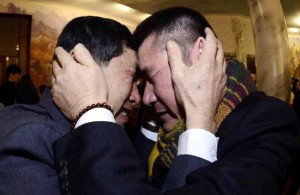Special to WorldTribune.com
By Donald Kirk, East-Asia-Intel.com
The North Korean propaganda machine is nothing if not super-skilled at emitting conflicting signals. One day they’re castigating the U.S. and South Korea for military exercises, and the next they’ve dropped the subject and are entertaining a bunch of elderly South Koreans at a reunion with their long-lost relatives.
Could the big switch have had anything to do with the realization that the United Nations’ Commission of Inquiry was about to unleash the most authoritative condemnation of North Korean human rights abuses ever leveled against the regime?

Surely we’re never going to be able to prove it, but the rapid sequence of the North Koreans caving in and agreeing to go through with the reunions without mentioning the war games and then having to deal with the U.N. report hardly sounds coincidental.
Not that any of that matters to the old people struggling to recognize one another and looking for the words to say to relatives, some of them cousins whom they never saw even when they were little. The last thing they’re worried about is a torrent of words from some U.N. commission that may well wind up on the trash heap of forgotten rhetoric after the Chinese have made sure the charges made in the report never get a hearing at the International Criminal Court in the Hague.
You may be totally sure the lucky few who got to cross the line into the North this week and join in the reunions at the base of Mt. Geumgang are not asking about the hardships of life in the North or the terror that their relatives who never made it to the south have had to bear all these years. For sure, North Korean busybodies are monitoring all the meetings at which the North Koreans know enough to thank Kim Jong-Un and his munificent father, Kim Jong-Il, and his grandfather, “Great Leader” Kim Il-Sung, for the inestimable privilege of seeing their blood comrades from the South.
The cruelty of the separation of families divided by the Korean War is just one of the abuses perpetrated by North Korean leaders who see the lure of bringing them together as another weapon in their inventory of ways to inflict psychological torture on the Korean people. Comparisons are always flawed, but in the era when Germany was divided between East and West after World War II relatives were able on occasion to communicate by phone and letter and even see each other. Not easy, of course, with the Stasi, the notorious East German security apparatus, listening in and opening all the mail, but at least the Germans had a lot better deal than the Koreans, who cannot communicate at all across the North-South line.
In all the voluminous contents of the U.N. report, how much attention was paid to the tragedy of the divided families? The report seemed to cover every shred of everything we’ve heard about the North Korean elite living it up on wine and fine food while their people starved, about torture chambers where “suspects” were subjected to unimaginable brutality and of the prison system to which they’re finally consigned, forced to work until dying of starvation, disease, torture, or execution.
All the stories are there, documented by defectors, expert witnesses and satellite observation of the four prison camps to which tens of thousands are consigned. But how much does the report dwell upon the tragedy of the divided families? It’s easy to play down that type of abuse. Nobody’s torturing or imprisoning them for not having seen one another since the early days of the Korean War. They suffer in silence, perhaps bearing the burden of decades of feeling guilty for having parted ways in desperation to survive.
“For decades, North Korea has never even allowed its people to exchange letters and telephone calls with family members and friends in South Korea,” writes David Straub, former senior diplomat with the U.S. Embassy in Seoul, now associate director of Korean studies at the Shorenstein Asia-Pacific Research Center at Stanford, in an email. “There can be no justification for this. This is one of the great tragedies of modern history,” he writes. “The entire international community should demand that Pyongyang allow normal communications between all friends and family members” — “a first step to allowing free communication and meetings between all the people of the divided halves of the peninsula.”
All true, but don’t count on anything beyond the extremely confined, tightly monitored meetings going on this weekend at Mt. Geumgang. The North Koreans are undoubtedly proud for having shown their humanitarian sensitivities by agreeing on them just before release of the U.N. report.
Columnist Donald Kirk covered the first family visits after Kim Dae-Jung and Kim Jong-Il at their summit in Pyongyang in June 2000 agreed they would be a good idea. He’s at kirkdon@yahoo.com.

You must be logged in to post a comment Login